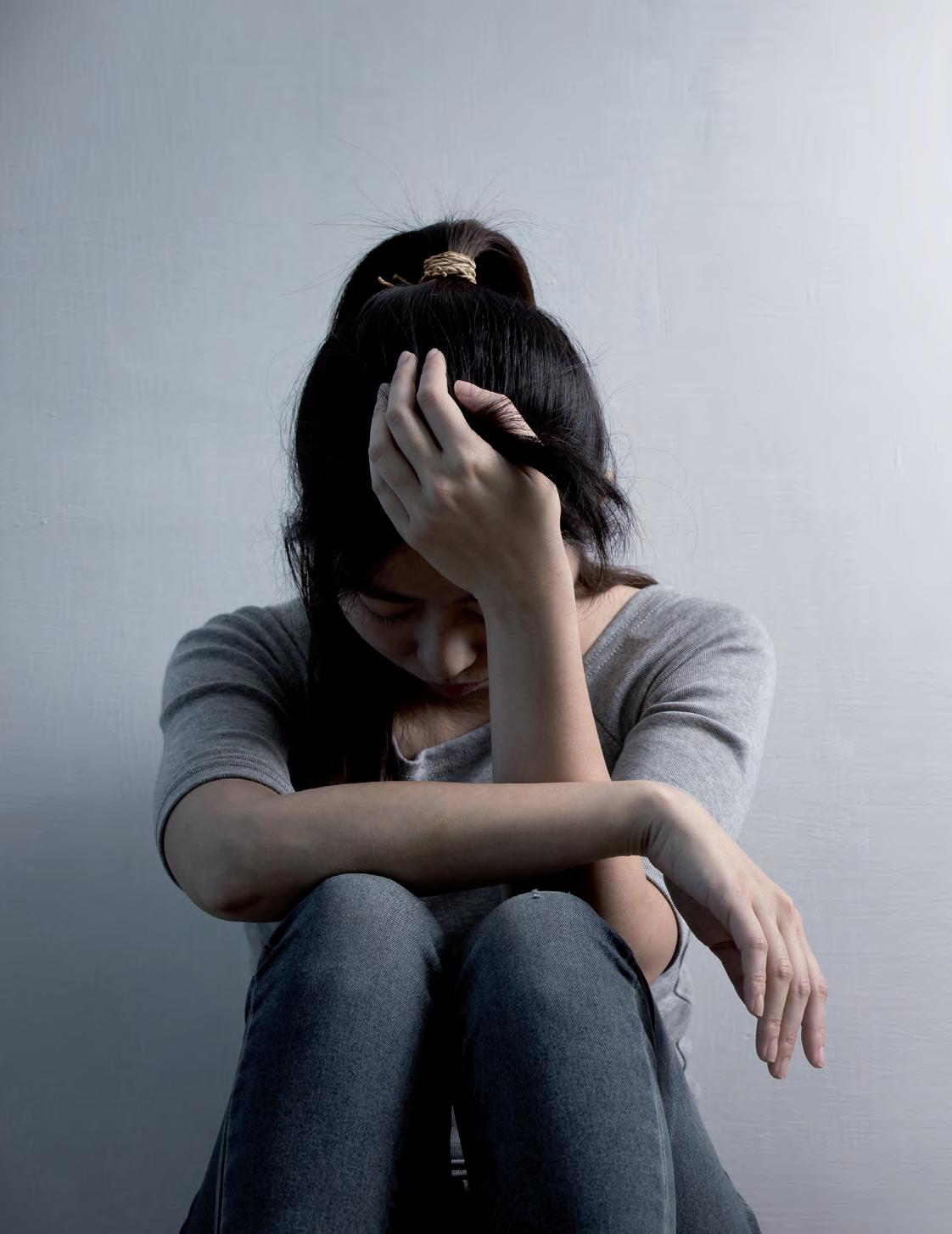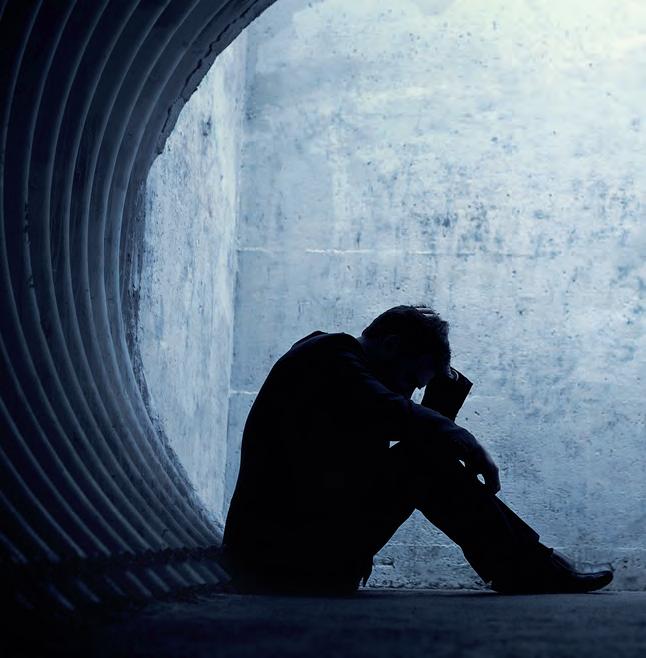
5 minute read
THE LINK BETWEEN TBI AND DEPRESSION
by TBI Times
WHERE TO GET HELP Many mental health professionals are qualified to treat depression. Psychiatrists have specialized training in medication management and can also counsel. Psychologists are specifically trained to provide counseling for depression, however, can not prescribe medication. In addition, some social workers are trained to work with people suffering from depressive symptoms. Often, primary care physicians are a good starting point when looking for help.

Advertisement
THE LINK BETWEEN TRAUMATIC BRAIN INJURY AND DEPRESSION

Depression is common after traumatic brain injury (TBI). About half of all people with TBI are affected by depression within the first year after injury.
BY GREY NOLAN
Every year, 1.7 million people in the US sustain a traumatic brain injury (TBI). Psychiatric disorders frequently complicate the course of recovery from TBI and occur at rates exceeding those of the general population. Major depression is the most common psychiatric disorder following TBI, affecting an estimated 29.4% of patients in the first year post-injury alone. TBI-associated depression contributes to higher suicide risk, altered executive function, poorer social reintegration, and vocational outcomes, and decreased quality of life. TBI has long been associated with changes in mood, personality, and behavior. Research suggests that psychiatric disorders may be present at increased rates after TBI and for this reason, TBI is considered by some medical professionals to be a risk factor for psychiatric diagnosis. “One example of how TBI can be connected with mood or anxiety disorders is when the cognitive complications associated with the TBI result in profound changes in the patient’s life. If they can no longer work and experience financial hadship or loss in purpose, this can lead to depression and anxiety,” says Dr. Emin Gharibian, Psy.D., founder, and director of Verdugo Psychological Associates. Research has shown that the specific aea of the brain affecte by the TBI translates directly to the potential side effects patient may experience. For example, injuries on the right side of the head are more likely to cause manic symptoms, and injuries on the left side of the head are more likely to cause depressive symptoms. Frontal-cortex injuries can lead to behaviors that are typically associated with personality disorders. This is because the frontal-cortex region of the brain is directly responsible for emotional regulation.
The chronic and relapsing course of TBI-associated depression poses a challenge to the management of afflicted patients. Two-thirds of patients depressed at 1-year post-injury remain so in the second year, and the risk of depression remains elevated for 20 to 30 years after the injury. The high prevalence, chronicity, and potentially irreversible consequences of post-TBI depression underscore the importance of developing interventions targeting this disorder. The length of time it takes for a patient with TBI to recover directly influences their chances of facing long term depression. With an extended recovery time, a patient’s socialization, work, autonomy, or even their ability to communicate will be affected. Changes in your typical routines and habits have a direct effect on your mental state and quality of life. Because of that, lingering TBI symptoms are strong activators of the behavioral inhibition system, causing symptoms of depression. Once the behavioral inhibition system is disturbed, the ability to feel pleasure or satisfaction can be lost.
For TBI patients, not only is that inhibition system overactive, but they’ve lost many of the activities that could jumpstart their behavioral activation system (which would help calm down the inhibition system and allow feelings of reward and pleasure again). Other factors to consider are sleep and pain. Many TBI patients experience disruption to their normal sleep patterns, and sleep deprivation itself can result in depressive symptoms. Additionally, the symptoms of depression can make it harder to sleep, so they work together to make everything feel worse. Coping with continuous pain is another factor. It is difficult for the brain chemistry to return to its normal state if it is reacting to pain signals. There are many ways to cope with post-TBI depression. Talking to close family or friends about how you are feeling is a great way to minimize isolation. Isolation exacerbates depression so it should be avoided if at all possible. If you are struggling with being in a crowd or around people, try to meet with one close friend in a quiet location. Research shows that listening to uplifting music, engaging in a creative activity, or reading a book are effective ways of copin with depression. Exercise is also a strongly proven antidote for depression. Just a few minutes each day will produce significant esults. Most importantly, seek the support of a professional who has experience treating patients with TBI. A TBI patient’s prognosis as it relates to depression is highly dependent on the type of TBI they experience. Patients who sustain an mTBI (minor TBI) tend to recover quickly, within one to three weeks, with little to no lingering symptoms. In these cases, depression is less of a concern. In a small percentage of mTBI injuries, patients may experience side effects for up to thee months, and as mentioned previously, longer recovery times can lead to long-term depression.
Complicated mTBIs can cause more cognitive impairment than uncomplicated mTBIs, and in the latter, recovery can take up to six months and mirror the recuperation associated with a moderate TBI.
Sustaining a TBI can be a lifelong challenge and can require a range of resources and strategies that extend far beyond initial recovery. When depression is a factor in recovery, it can be even more challenging. Neuropsychologists and neuropsychiatrists are not only important for diagnosis and first phases of treatment but can also be an important part of a long-term treatment plan which addresses mood and emotional wellbeing, helping TBI survivors thrive in their daily lives long after their injury.
RESEARCH HAS SHOWN THAT DAMAGE TO THE LEFT HEMISPHERE OF THE BRAIN MAY CAUSE DEPRESSIVE SYMPTOMS.
- DR. EMIN GHARIBIAN, PSY.D.









